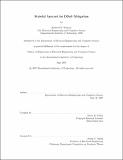Stateful anycast for distributed DDoS mitigation
Author(s)
Hansen, Richard E., M. Eng. Massachusetts Institute of Technology
DownloadFull printable version (567.6Kb)
Alternative title
Stateful anycast for distributed denial-of-service mitigation
Other Contributors
Massachusetts Institute of Technology. Dept. of Electrical Engineering and Computer Science.
Advisor
Karen R. Sollins.
Terms of use
Metadata
Show full item recordAbstract
Distributed denial-of-service (DDoS) attacks can easily cripple victim hosts or networks, yet effective defenses remain elusive. Normal anycast can be used to force the diffusion of attack traffic over a group of several hosts to increase the difficulty of saturating resources at or near any one of the hosts. However, because a packet sent to the anycast group may be delivered to any member, anycast does not support protocols that require a group member to maintain state (such as TCP). This makes anycast impractical for most applications of interest. This document describes the design of Stateful Anycast, a conceptual anycast-like network service based on IP anycast. Stateful Anycast is designed to support stateful sessions without losing anycast's ability to defend against DDoS attacks. Stateful Anycast employs a set of anycasted proxies to direct packets to the proper stateholder. These proxies provide DDoS protection by dropping a session's packets upon group member request. Stateful Anycast is incrementally deployable and can scale to support many groups.
Description
Thesis (M. Eng.)--Massachusetts Institute of Technology, Dept. of Electrical Engineering and Computer Science, 2007. This electronic version was submitted by the student author. The certified thesis is available in the Institute Archives and Special Collections. Includes bibliographical references (p. 97-103).
Date issued
2007Department
Massachusetts Institute of Technology. Department of Electrical Engineering and Computer SciencePublisher
Massachusetts Institute of Technology
Keywords
Electrical Engineering and Computer Science.